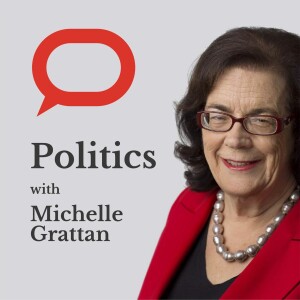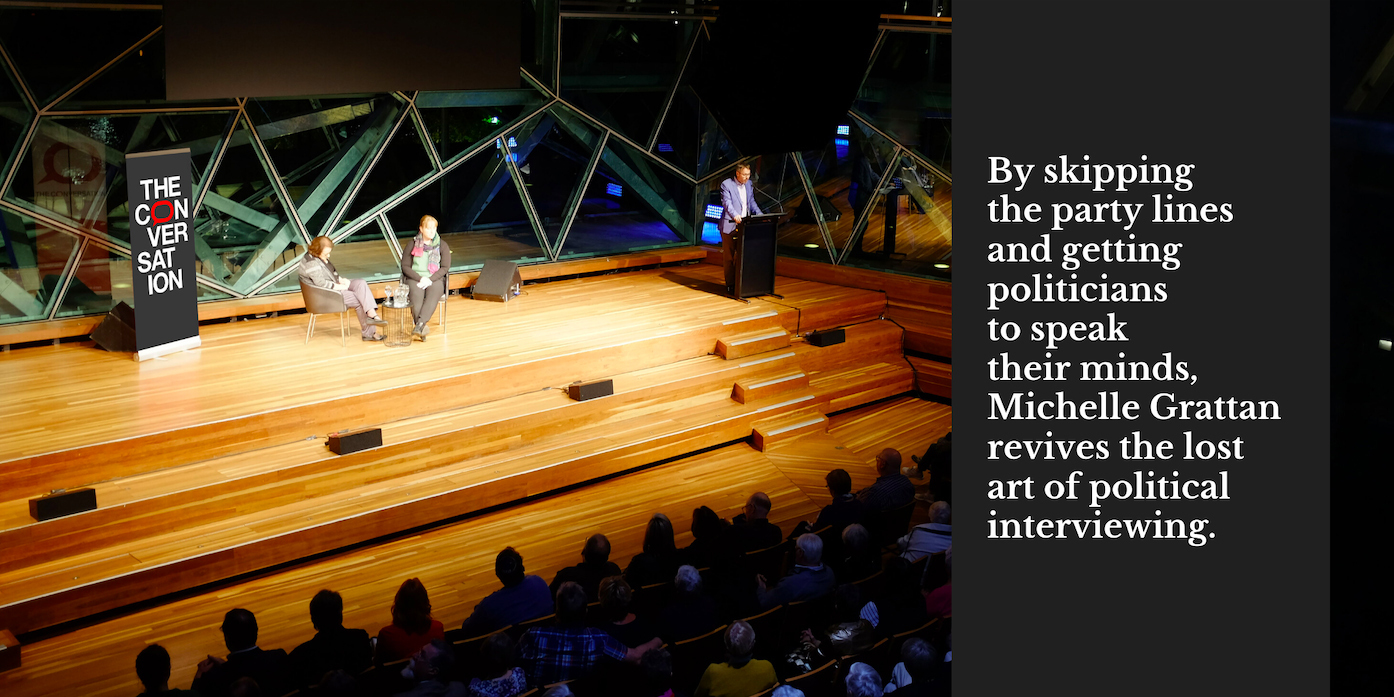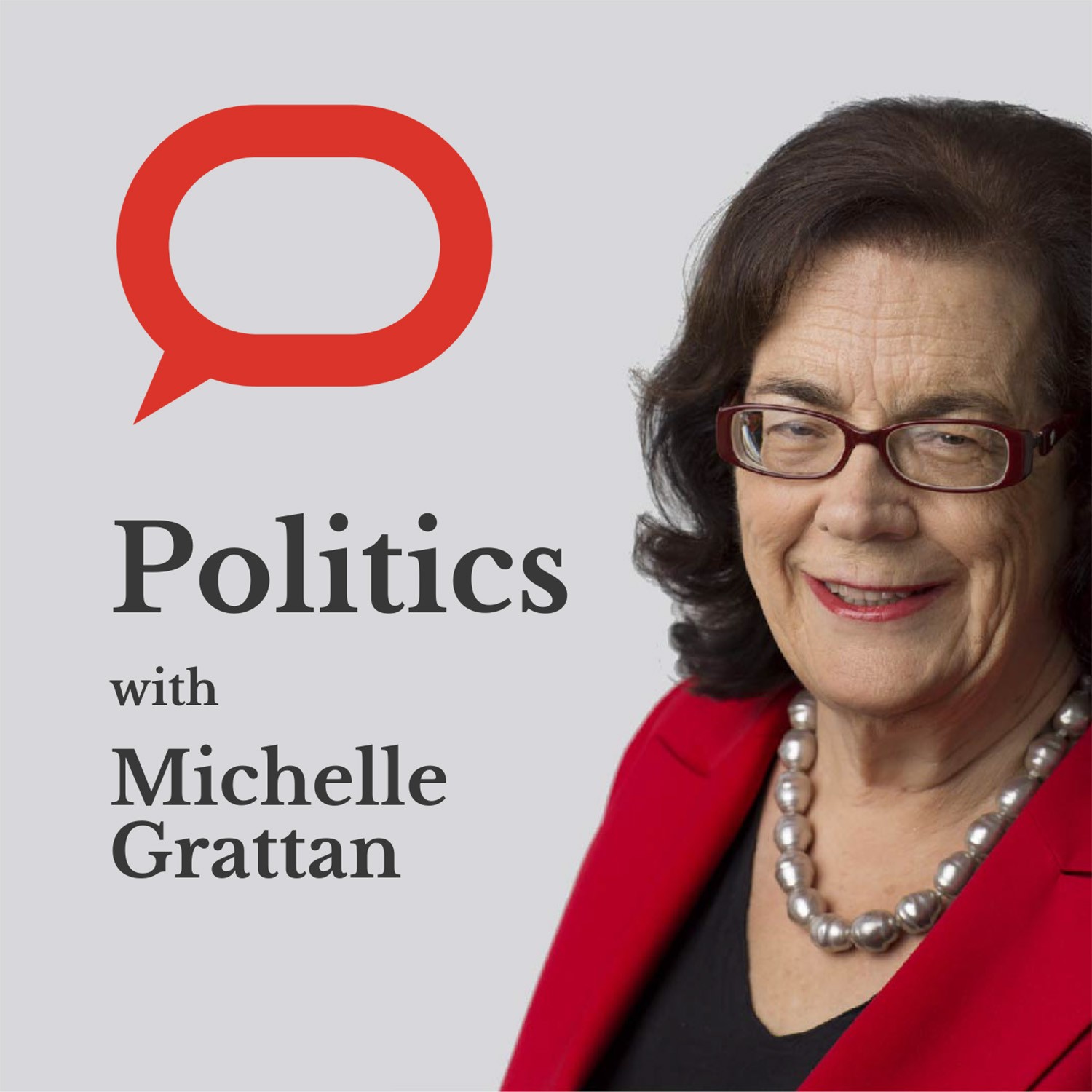Episodes

Friday Dec 17, 2021
Friday Dec 17, 2021
In her last podcast for the year, Michelle Grattan speaks with Treasurer Josh Frydenberg about the mid-year budget update, his optimism about the economy, and the election.
Although Scott Morrison has the option of a March poll, Frydenberg says he is working on the assumption he’ll deliver a budget on March 29, which would put the election in May.
Frydenberg says he’ll be “spending my Christmas period doing other than eating turkey and having a quiet beer on the balcony and looking at the beach in Lorne. I will be thinking about the budget, thinking about next year’s election and hoping to frame the contest about economic management.”
He admits that with the pandemic “there’s a lot of uncertainty out there.” But he stresses that the “one message I want to give to all your listeners today is there is no complacency. We’re not out of this thing yet.”
Frydenberg says he is still “very confident about the economy going forward”, with plenty of spending power to help it along.
“We have this wave of money that’s been accumulated by households and businesses because the restrictions meant that they couldn’t spend it and they will in time.”

Monday Dec 13, 2021
Sean Kelly and Anne Tiernan on election year
Monday Dec 13, 2021
Monday Dec 13, 2021
In this podcast Michelle Grattan speaks with Sean Kelly and Anne Tieran about where the political battle stands as we look to the 2022 federal election.
Kelly, a former staffer to then prime ministers Julia Gillard and Kevin Rudd, has just written The Game: A Portrait of Scott Morrison. Anne Tieran, adjunct professor at Griffith University, has co-edited the newly-released book The Oxford Handbook of Australian Politics.
Kelly and Tiernan canvass a broad range of topics.
Will questions around the PM’s character be pushed aside by the economic debate? How potent will the climate issue be? How will well-funded independent candidates fare? What about the Greens’ ambitions? What’s happening in the vital state of Queensland? Will the women’s vote be especially significant this time? How would a hung parliament work out? How do voters feel after two years of COVID and what influence might this have?

Tuesday Dec 07, 2021
Michelle Grattan on Labor’s climate policy and Liberal’s fight for Warringah
Tuesday Dec 07, 2021
Tuesday Dec 07, 2021
As well as Michelle Grattan’s usual interviews with experts and politicians about the news of the day, Politics with Michelle Grattan now includes “Word from The Hill”, where all things political will be discussed with members of The Conversation’s politics team.
This week they discuss Labor’s newly announced climate policy which includes a target of 43% emissions reduction. They discuss how this plan differs from the Coalitions target and the support it has from key business groups.
They also canvass the push for former NSW Premier Gladys Berejilikan to run for the federal election in a bid to win the seat of Warringah back from Independent Zali Steggal. This move, if it goes ahead, is controversial as there is still an ongoing ICAC investigation into her conduct.
The United States has announced that they will hold a diplomatic boycott of the Beijing Winter Olympics, with speculation that the Morrison Government will follow the lead of the US. This boycott is over human rights in China. This is a diplomatic gesture rather than a full boycott, as the athletes would still attend.

Tuesday Nov 30, 2021
Politicians condemn bad behaviour, and then behave badly
Tuesday Nov 30, 2021
Tuesday Nov 30, 2021
As well as Michelle Grattan’s usual interviews with experts and politicians about the news of the day, Politics with Michelle Grattan now includes “Word from The Hill”, where all things political will be discussed with members of The Conversation’s politics team.
This week they discuss the just-released Jenkins Report on workplace culture in Parliament House. This was commissioned after allegations of rape by former Liberal staffer Brittany Higgins.
At a Tuesday news conference, Scott Morrison deplored what had been found and promised action, but it will take more than promises to change this culture.
Immediately afterwards in parliament, there was a lot of bad behaviour.
Omicron, the new Coronavirus variant, has arrived in Australia just as the country was about to open its borders to workers and students (now delayed). Although the government is reacting cautiously to Omicron, saying it needs more information, Morrison’s message is that we don’t want more lockdowns, we want to continue to open up and not go backwards.
The provisional 2022 parliamentary calendar, issued this week, includes a March budget. Scott Morrison believes an election framed by a budget is the best electoral course, although the March poll option has its supporters.

Wednesday Nov 24, 2021
Jenny McAllister on domestic violence
Wednesday Nov 24, 2021
Wednesday Nov 24, 2021
Labor has announced that in government it would appoint a family domestic and sexual violence commissioner and also fund 500 new community sector workers to help women at risk or in crisis.
Labor spokeswoman Jenny McAllister says more staff are desperately needed. “I visited a service last week in western Sydney that said that over the last year they’d helped around 1200 women who were seeking their assistance to escape violence. But they turned away 1100 because they didn’t have the workers to support them.”
Asked why, despite increased attention and funding for combatting domestic violence, we don’t seem to be getting on top of the problem, McAllister says she doesn’t “underestimate how complex and challenging it will be to produce sustained reduction in rates of violence.”
But, she argues, a change of government is needed “to restore that momentum and energy that was there at the beginning of this planned process”.
Earlier this year there were nationwide marches on women’s justice issues. Has the momentum faded? McAllister says: “There is still an enormous trust deficit between the prime minister and Australian women […] Australian women had had enough.”

Tuesday Nov 23, 2021
Christmas can’t come too soon for Morrison
Tuesday Nov 23, 2021
Tuesday Nov 23, 2021
As well as Michelle Grattan’s usual interviews with experts and politicians about the news of the day, Politics with Michelle Grattan now includes “Word from The Hill”, where all things political will be discussed with members of The Conversation’s politics team.
As parliament is in its final sitting weeks for the year, the religious discrimination bill was put to the coalition party room. Concerns with the bill, to be introduced by Scott Morrison on Tuesday were raised by Liberal moderates. It will be sent to a senate committee and its fate remains up in the air.
Queensland MP Andrew Wallace is the new speaker, and the Opposition was quick to test him out in Tuesday’s question time.
The government will be pushing its legislation for Voter ID during this sitting. But it’s not clear where the numbers lie, with Labor strongly opposing a move that it says will make it harder for the disadvantaged to vote.
The prime minister’s integrity has been again in the spotlight, over a text message he sent to Anthony Albanese when he was on route to Hawaii in 2019 during the bushfires.

Thursday Nov 18, 2021
Liberal Dave Sharma on 2030 target
Thursday Nov 18, 2021
Thursday Nov 18, 2021
Liberal backbencher Dave Sharma, a former diplomat, is an up-and-comer in his party and one of its moderate voices.
Holding the progressive electorate of Wentworth, where formerly Malcolm Turnbull was the member and climate change is a significant issue, Sharma was among those Liberal MPs who pressed Scott Morrison on the 2050 target before Glasgow.
In this podcast Sharma discusses climate policy, the religious discrimination legislation, a national integrity commission, voter ID, China, and the Liberal party.
Asked whether the government should improve its medium-term target at next years climate conference - which the government is not disposed to do - he argues for leaving options open.
“I wouldn’t be ruling it out, but nor do I think we necessarily need to be ruling it in. I think we need to maintain our options.
"I think we always need to be mindful of where the international environment is at on this, and that’s very much shaped our attitude towards adopting net zero by 2050.
"Australia has always been a country that doesn’t seek to be an outlier in the world. It seeks to move with the major currents of world opinion and world developments.”
With the government’s religious discrimination legislation due to be introduced next week, Sharma says: “My concern is that what should be a shield only does not, is not allowed to become a sword.
"People should be protected against discrimination on the basis of their religion. But someone’s religion or faith should not give them a positive right to discriminate against other people.”
On China, he’s encouraged by the recent joint US-China statement on climate and this week’s talks between President Joe Biden and President Xi Jinping, and urges efforts to improve Australia-China relations.
“We live in the same region together. There’s a remarkable degree of common interests that we share. We’re well integrated trading and economic partners. It’s too important a relationship [..] not to be striving every day to ensure that it works better.”

Tuesday Nov 16, 2021
On Morrison’s character ratings
Tuesday Nov 16, 2021
Tuesday Nov 16, 2021
As well as Michelle Grattan’s usual interviews with experts and politicians about the news of the day, Politics with Michelle Grattan now includes “Word from The Hill”, where all things political will be discussed with members of The Conversation’s politics team.
This week they discuss Morrison’s fall in ratings on character qualities in the latest Newspoll, published in The Australian . The poll ranks Scott Morrison and Anthony Albanese on traits such as trustworthiness, likeability, and care for people. On all but three, Morrison fared worse than Albanese.
They also canvass Australia’s position post COP26, with nations already gearing up for next year’s conference and how Australia has refused to increase its 2030 targets in line with other countries.
Campaigning has started for the 2022 election, and Morrison has already launched his scare against Labor, with claims of rising interest rates and petrol prices under an ALP government. This tactic has drawn comparisons with the 2004 election, when John Howard ran on similar lines.

Thursday Nov 11, 2021
Chris Bowen says Labor’s climate policy will be ‘realistic and ambitious’
Thursday Nov 11, 2021
Thursday Nov 11, 2021
With the Glasgow conference nearly over and the government promising to release its climate policy modelling before parliament resumes later this month, eyes are turning to Labor for its long-awaited alternative.
Climate change spokesman Chris Bowen says the policy will be both “realistic and ambitious” – which of course neatly embraces the debate within Labor about how far to differentiate itself from the government on an issue that caused it grief at the 2019 election.
“I hope and intend to be the climate change minister within six months. So anything we say […] it’s got to be realistic. But it will be realistic and ambitious. Both of these things can be true.”
Bowen slates the government for its lack of ambition. “We like to be an influential country and we have never been as out of touch on any issue ever in our foreign affairs than we are on climate change. So I think there’s a particular onus on Australia.”
On one of the issues to the forefront this week – ways to encourage electric cars – Bowen says there’s “a legitimate conversation to be had” about fuel standards (which NSW environment minister Matt Kean says should be addressed by the federal government).
Labor earlier this year announced measures on electric cars and has more policy to come.
Bowen says Morrison’s attempt to wedge Labor by linking an expansion of the remit of the Clean Energy Finance Corporation to the $500 million for a new fund to encourage the commercialisation of technology, has backfired.“Two coalition senators have come out and said they’re crossing the floor to vote against it. […] He’s wedged himself.”
Asked about the claims the renewable sector won’t produce as many jobs as the old fossil fuel sector, Bowen says: “Every dollar spent on renewable energy and energy efficiency creates three times more jobs than a dollar spent on traditional energy.
"And that’s also true when you consider some of the other things the country has to do […] we also have to upgrade our transmission massively to get renewable energy from where it’s generated to where it’s consumed. Our electricity grid can’t cope. So we need billions of dollars of investment to upgrade our transmission grid. We have a policy to do that and that’ll create lots of jobs.”
“I see it as a positive story to say we’re going to diversify regional economies, create new jobs, have lots of regional job creation as we go. And that’s a positive story for Australia’s regions.”
But, Bowen says, “it is dishonest to pretend that coal communities aren’t going to be impacted by reducing coal exports as countries move away from coal fired power.”
“We’re also going to have detailed plans for communities. We’re also going to have an opportunity for them to have a say from the ground up in their economic future.”
Speaking more generally about what the Labor party stands for today, Bowen says: “We still stand for growth and opportunity, which is what I’ve always said Labor stands for. Economic growth lifts people out of poverty. It turns aspiration into reality and we stand for giving people the opportunity to make the most of that. Though I do not mean a sort of narrow ‘equality of opportunity’ frame. I mean, the opportunity to live their lives to their fullest capacity.”

Wednesday Nov 10, 2021
Scott Morrison has decided electric cars won’t threaten Aussie weekends
Wednesday Nov 10, 2021
Wednesday Nov 10, 2021
As well as Michelle Grattan’s usual interviews with experts and politicians about the news of the day, Politics with Michelle Grattan now includes “Word from The Hill”, where all things political will be discussed with members of The Conversation’s politics team.
Scott Morrison is gearing up for the election in the first half of 2022. As the country emerges from COVID constraints, the PM is trying to make up for lost time on the ground, travelling in NSW and Victoria this week. He’s selling some of the nitty gritty of his emissions reduction policy, including a plan to encourage the take up of electric cars.
But in Melbourne he was confronted by his own embarrassing quotes from 2019, when he laid into Labor’s policy on these vehicles, claiming they would “end the weekend” and that people who lived in apartments would have to dangle an extension cord out of their windows to charge their cars.
Michelle and Amanda also canvass the latest developments in the allegations, involving federal MPs, of branch stacking activities in the Victorian Liberal and Labor parties, and the slow grind in the quest for a federal integrity commission.

